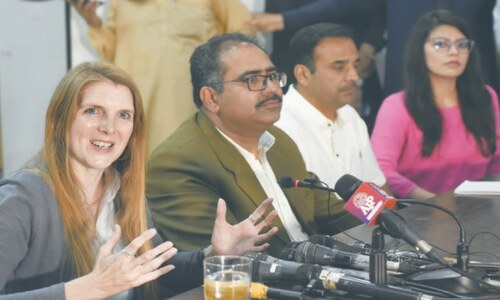ISLAMABAD: Seminary student Anwar Jan from the Upper Dir district was busy in reading an English textbook outside the Mohammadi Mosque in Shahzad Town as his colleagues played football in the nearby ground.
“After passing my secondary level exam, I left my studies for three years and then joined this madressah to memorise the holy Quran,” he said while talking to Dawn.
“It was the dream of my father that I should become a religious scholar. Now I am near to complete the first year of the course,” Anwar added.
He said the course took eight years to complete, adding he was also interested in continuing his formal education and get a master’s degree in English literature.
“Recently, I purchased books for the intermediate class as I want to appear in the annual examination 2015 as a private candidate.”
Anwar said hundreds of students in the seminaries wanted to also get formal education but there were no arrangements in the seminaries to hold such classes.
Like Anwar, Zubair Ali, 23, a resident of Bhara Kahu in Islamabad, is also pursuing the Dars-i-Nizami degree at Jamia Fareedia, Sector E-7.
“After passing my matric exam, I joined the religious seminary and will complete the course next year.”
Ali said hundreds of students completed the course every year but many of them could not get jobs due to the lack of opportunities. He said the management of the religious seminaries should also impart formal education.
“The students of religious seminaries belong to the poor families and it is difficult for them to get formal education after completing their religious education,” Ali added.
Mudassir Rehman, 27, has completed his Dars-i-Nizami course from Jamia Usmania in Peshawar and is now enrolled with Jamiatul Fatwa Takhsees in Rawalpindi for the two-year course of Mufti, an interpreter or expounder of the Islamic law.
He said according to the Higher Education Commission (HEC), Dars-i-Nizami course was equal to the master’s degree in Islamic Studies or Arabic. “I also got the same master’s degree from Peshawar University after completing the Dars-i-Nizami course.”
Mudassir said he applied for the post of Naib Khateeb in the army but the Army Selection and Recruitment Centre refused to consider his master’s degree ‘even equal to intermediate’.
He said he had also started preparations for the intermediate exams next year.
Another resident from Muzaffarabad, Jawad Hussain, 26, has completed his Dars-i-Nizami course from Jamia Fareedia.
He also said almost all students in seminaries wanted to get formal education but it was difficult for them to pursue their dream due to poverty.
According to the representative of the Ittehad Tanzeemat Madaris Pakistan (ITMP), around 25,000 seminaries are providing religious education to over two million students across the country.
He said around 18,000 seminaries were attached with the Wafaqul Madaris of Deobandi sect, 4,000 with Tanzimul Madaris of the Barelvis, 1,500 with Wafaqul Madaris al Salafia of Ahl-i-Hadith, 1,000 with Wafaqul Madaris of Shia sect and 500 with Rabtatul Madaris al Islamia of Jamaat-i-Islami.
When contacted, spokesman for ITMP Abdul Quddus Mohammadi said the seminaries were established to fulfil the religious needs of the Muslims.
He said it was difficult for the management of the religious seminaries to arrange classes of intermediate and graduation levels due to lack of resources.
“The government has already failed to introduce a uniform education system for the poor and the rich so how it can bring reforms in the seminaries by introducing contemporary subjects in its curriculum,” he asked.
Chairman Higher Education Commission (HEC) Prof Dr Mukhtar Ahmed told Dawn that the seminaries issued degrees of Shahadatul Alamiya to students who completed the eight-year course of Dars-i-Nizami. He said the HEC considered the degree equal to a master’s degree in Islamiat or Arabic.
“This initiative by the HEC was to help the students of religious seminaries get jobs because they teach Islamiat and Arabic at the college or university levels,” he said.
Director General Accreditation and Attestation of the HEC Raza Chohan said they had recognised 10 religious institutions for the issuance of Shahadatul Alamiya degree.
“Although it is equal to a master’s degree in Islamiat or Arabic, it depends on the employer’s to select or reject the seminary graduates for the post of Khateeb etc,” Mr Chohan said.
Religious scholar Dr Anees Ahmed said the government can support the students of the seminaries by introducing formal education to bring them into the mainstream.
Recently, the National Assembly also adopted an opposition resolution in which it was demanded that the government should take steps to ‘improve and regulate’ education in the seminaries.
Mohammad Amir Rana, the director of Pakistan Institute for Peace Studies, said madressahs, particularly those promoting extremist mindsets, were the nurseries for jihadi and sectarian groups.
He said religious parties felt that the government wanted to control the madressahs under the guise of reforms. He said reforming madressahs should not necessarily be about controlling the institutions or doing away with religious education.
Federal Minister for Religious Affairs Sardar Mohammad Yousuf told Dawn that the government wanted to introduce reforms in the seminaries with the consensus of all stakeholders.
He said a meeting with the representatives of the seminaries was already held while the second meeting was expected within a week.














































Dear visitor, the comments section is undergoing an overhaul and will return soon.